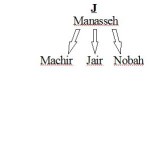Two of the four named rivers of the mythic Eden—the Tigris, Euphrates, Pishon, and Gihon—are well known. Pishon, however, cannot be identified and Gihon, whose name means “gusher,” is given two very different geographical locations in the Bible. On the one hand, Genesis 2:13 informs us that Gihon circles the land of Cush, which is Ethiopia (Gen 10:6). 2 Chronicles 32:30, however, informs us that it was a river spring nearRead More
Category: Chronicles
#8. Who was the father of Lamech: Methushael OR Methuselah?
#9. Who was the father of Enoch: Cain OR Jared?
#10. How many antediluvian patriarchs were there: 8 OR 10?
Part of the Priestly redactor’s interpretive framework included the use of extensive genealogical lists, or records of generations, in Hebrew toledoth. These toledoth provide a structural unity and shape to the narrative arc of Genesis, and the Priestly redactor inserted them throughout the book of Genesis to transition from one story to the next, or from the end of one age or generation to the beginning of the next. Thus, theRead More
#254. Who can burn incense in front of Yahweh: only Aaronids OR not? (Ex 30:7; Num 17:5; 1 Chr 23:13; 2 Chr 26:16-19; Lk 1:8-11 vs Deut 33:10; 1 Sam 2:28; 1 Kgs 9:25)
The message endorsed through the tale of Korah’s rebellion in Numbers 16-17—that only the Aaronid priests can offer incense to Yahweh and only at Yahweh’s altar—is yet but another story in a long list meant to legitimate the Aaronid’s sole right to minister to Yahweh. We have now seen in this Aaronid written text, the Priestly source, “Yahweh” endorse: the sole selection of the Aaronids as his priests, while at theRead More
#299. Does Yahweh make an eternal covenant with the Aaronid priesthood via Phinehas OR with the Levitical priesthood in general OR with only the Zadokite line OR with the Davidic line OR with Jesus Christ via Melchizedek? (Num 25:6-13 vs Deut 18:1-5, 33:8-10; 1 Sam 2:28; Jer 33:18-22; Mal 2:4 vs 1 Sam 2:35; Ezek 40:46, 43:19, 44:15-16 vs Ps 110:4 vs Heb 7:11-25)
As a collection of diverse writings spanning roughly a thousand years, the Bible itself bears witness to the internecine priestly rivalries that plagued ancient Israel, and in one case even extended into the Christian era. And as is apparent from this entry’s title, each of these competing priestly guilds wrote a text whose purpose was to legitimate their guild’s right to be Yahweh’s sole anointed priests forever. In this rather lengthyRead More
#300. Is Bechar Benjamin’s son OR Ephraim’s son? (Gen 46:21; 1 Chr 7:6 vs Num 26:35)
#301. Were Ard and Naaman sons of Benjamin OR sons of Benjamin’s son Bela? (Gen 46:21 vs Num 26:40)
#302. Are Benjamin’s 5 sons Bela, Ashbel, Ahiram, Shephupham, and Hupham OR Bela, Ashbel, Aharah, Nohah, and Rapha? (Num 26:38-39 vs 1 Chr 8:1-2)
The Priestly genealogy preserved in Numbers 26 serves as a book-end to the whole wilderness period where the first registry, narratively speaking, was recorded in the Priestly tradition of Genesis 46:8-27 (see #76). In comparing the two lists—which for the most part are similar—we notice nevertheless some minor discrepancies, most of which deal with different spellings for names, or missed or unlisted clans (specifically compare the clans listed for the Simeonite,Read More
#312. Was the tamid to be performed once daily OR twice? (2 Kgs 16:15; Ez 46:13 vs Ex 29:38-42; Num 28:3-8; 1 Chr 16:40)
Despite Number 28’s decree that the tamid was to be offered twice daily, in the morning and in the evening, this sacrificial legislation seems to reflect public cultic practices of a late time period in Israelite history, to be exact of the post-exilic period. First, as we saw in the previous entry (#311), the tamid is only mentioned two times in all of Torah legislation, and not surprisingly in some ofRead More
#319. Is Jair Manasseh’s son OR great-grandson? (Num 32:41; Deut 3:14 vs 1 Chr 2:22)
#320. Is Gilead a personal name OR a toponym? (Num 26:29-30, 36:1, 1 Chr 7:14-19 vs Num 32:39-42)

This contradiction could just as well have been titled: Two variant traditions on how to legitimate the possession of Gilead. If we compare the genealogies of Manasseh’s sons as portrayed in Num 26:29, 36:1, Josh 17:1, and 1 Chr 2:21-22 (P) with that of Num 32:39-42 (J) we notice some interesting discrepancies. Not surprisingly, these variant genealogies have their origins in two different traditions: the former list of passages come fromRead More